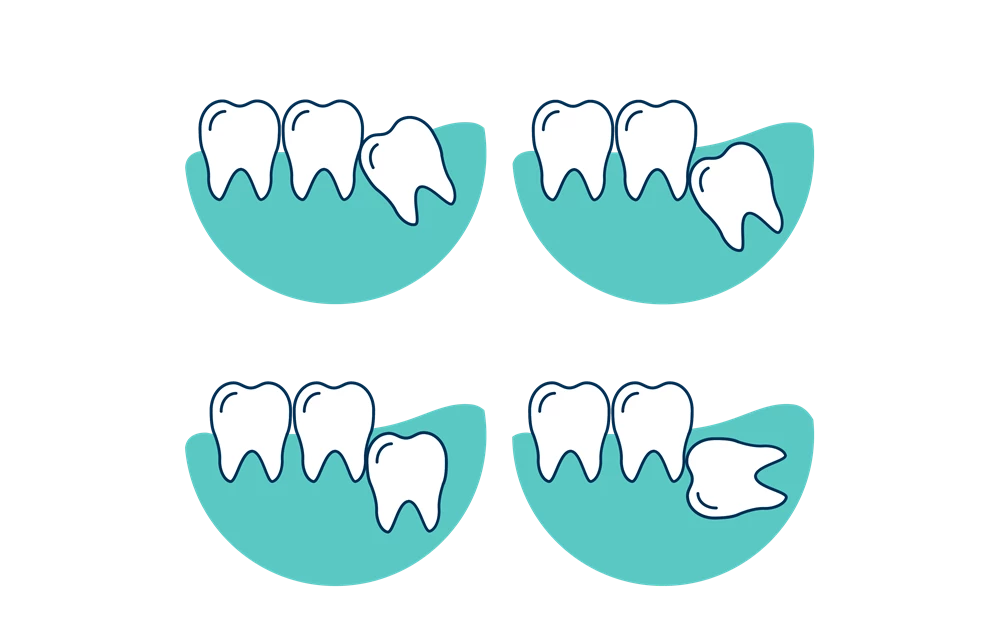- About us
- Dental Problems
Teeth & Gums
Cosmetic Improvement
Common Issues
- Treatments
Dental Services
Cosmetic Dental Services
Dental Specialists
- Before & After
- Patient Safety
- Contact
- Blog
-
Clinic Timing
12:00pm to 9:00pm
- About us
- Dental Problems
Teeth & Gums
Cosmetic Improvement
Common Issues
- Treatments
Dental Services
Cosmetic Dental Services
Dental Specialists
- Before & After
- Patient Safety
- Contact
- Blog
Treatments
Wisdom Teeth Removal
The extraction of wisdom teeth is an action performed with such regularity that it has become a somewhat banal occurrence. Although you may be feeling apprehensive, rest assured that the process is not as unpleasant as you might imagine. If you have received news that your wisdom teeth must be extracted, you may be experiencing some trepidation. However, do not fret, for our team of considerate dentists are experts in making the removal of your wisdom teeth a seamless and worry-free experience.
What Is It?
Many people need to have their wisdom teeth removed due to problems they are having. The removal of wisdom teeth is a frequent dental procedure. The removal of wisdom teeth by a professional, such as an oral and maxillofacial surgeon, is occasionally necessary.
Timely removal of your wisdom teeth may also help to avoid additional issues if they have gotten impacted or lodged under your gums.
These include:
- Gum flap on top of tooth infection
- Deterioration in the wisdom teeth
- Damage to the teeth nearby
- A cyst that could be harmful to the nearby bone’s health
Your dentist will evaluate your wisdom teeth and your alternatives for having them removed when you visit. To aid with the removal of a tooth, an incision may occasionally be created in the gum to expose the entire tooth. In other circumstances, the tooth may need to be extracted in parts after some of the surrounding bone has been removed.

Need To Know
Appointments
- 1 or 2 appointments
- At the first consultation visit your dentist will listen to your needs, examine your teeth and discuss the options with you
- Usually you would have your wisdom teeth removed at your next appointment
How long it takes
This depends on the removal procedure and where it is done.
- In a general dental practice the extraction will usually take around 30 to 60 minutes
- At oral surgery clinics it will usually take around 45 to 90 minutes
- For extraction under general anaesthetic at the hospital you will usually be at the hospital for around 2 to 3 hours
Before your appointment
For the consultation you will not need any special preparation, but you should have knowledge to hand about your dental and medical history.
Before surgery with local anesthesia you should:
- Take pre-surgery medication at the time if prescribed
- Have someone accompany you and drive you to your appointment
- Follow the eating/fasting protocol given to you by your dentist
- Wear something warm and comfortable with loose sleeves.
After your appointment
If you have had any wisdom teeth extraction procedure done:
- Use ice packs as much as possible to prevent swelling during the first 48 hours
- Don’t rinse your mouth out on the day of the surgery as it will cause bleeding
- Don’t smoke for as long as possible after surgery
- Be careful with hot food and drinks
- Eat a soft food diet
- On the day after the removal, rinse three times a day after meals with warm, salty water
- Use prescribed mouthwash from the following day, morning and night
You may be asked about
- Your dental history and medical history
- Your symptoms
- Your sedation preferences
Quick tip
- It’s normal to experience some swelling and discomfort following wisdom teeth removal. We usually recommend taking a couple of days off work to rest. It’s also normal to experience some bleeding or slight oozing from the wounds after the extraction. Your dentist will give you gauze to help control the bleeding. You will need to bite down with gentle pressure for around 20 to 30 minutes if this happens.
FAQs
01. How much does it cost to get wisdom teeth removed?
The cost of wisdom tooth removal can vary depending on the complexity. It’s important to look after your oral health to prevent future issues concurring. That’s why it’s often best to get your wisdom teeth removed. When you experience pain from your wisdom teeth, we recommend you visit a dentist. The dentist will assess your wisdom teeth and give you an estimate for the cost of removal.
02. Will I feel pain during the operation?
Your dentist will assess the difficulty of extracting your wisdom teeth and discuss your options with you. Wisdom teeth can often be removed with a simple local anaesthetic to numb the area, so you won’t feel any pain at all during the extraction procedure. We also offer different sedation options to help you feel more relaxed during the surgery or to make sure you have a limited memory of the procedure. If general anaesthetic is required, then this will be done by a specialist at a hospital.
03. How will I feel after the operation?
After the operation, you may have experience some discomfort and swelling which can last up to a week. Pain medication will be prescribed to help you with the any discomfort. The swelling may make it difficult for you to open your mouth wide, and you will need to eat soft foods that don’t need a lot of chewing. You will also need to allow for rest after the surgery.
04. Are there any risks with this surgery?
Yes, there are risks as there are with all operations. Your dentist will talk you through any problems that may arise from the removal. One of the risks is that you could develop an infection. This delays healing and can cause discomfort. To help prevent this, you’ll be given care instructions and sometimes an antibiotic to take during the healing period. Another risk is nerve damage close to the wisdom teeth. If nerves are damaged, they can cause a tingling or numbness of the chin, tongue or lip, on the side worked on. This numbness usually subsides over a few months. Sometimes during surgery, damage can occur to the adjacent teeth and fillings. Your dentist will advise you about your individual risks.

